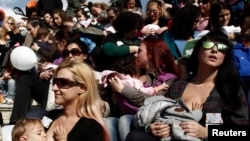The United Nations Children’s Fund (UNICEF) warns that 77 million babies deprived of mother’s milk within the first crucial hours after birth are at great risk of dying within a month. To mark World Breastfeeding Week (August 1 to 7), UNICEF and the World Health Organization (WHO) are calling for newborns to be breastfed exclusively for six months.
UNICEF says newborns should be breastfed within the first hour of life. This provides them with the essential nutrients, antibodies and skin-to-skin contact with their mother that protects them from disease and death.
UNICEF reports the longer breastfeeding is delayed, the higher the risk of death in the first month of life. It warns delaying breastfeeding by 24 or more hours after birth increases that risk to 80 percent.
On the other hand, it notes more than 800,000 lives would be saved if all babies were fed nothing but mother’s milk from the moment they were born until six months of age.
Unfortunately, the World Health Organization says this message is slow in getting through. WHO spokeswoman, Fadela Chaib, said new mothers are not receiving the support and encouragement they need to breast feed their babies.
“The slogan this year is breastfeed anywhere, any time because it is also, as I said, the role of society to make this possible for mothers who want to breast feed. This being said, yes, it is an old problem. We have always been advocating for more breastfeeding because we are convinced of the benefit of breastfeeding. It is really the ideal food for infants,” said Chaib.
For example, she said, breastfeeding protects children against many common illnesses. Breastfed children perform better on intelligence tests, are less likely to be overweight or obese and less prone to diabetes later in life.
Chaib told VOA that inappropriate marketing of infant formula continues to undermine efforts to get women to breastfeed their babies.
“We are not against them producing this kind of milk. What we are against is the fact that they promote it as if it is the same value that the milk of the mother. It is a lie. It is not the same,” said Chaib.
Progress in getting more newborns breastfed within the first hour of life has been slow over the past 15 years. Surveys show in sub-Saharan Africa, where under-five mortality rates are the highest in the world, early breastfeeding rates have remained unchanged.




